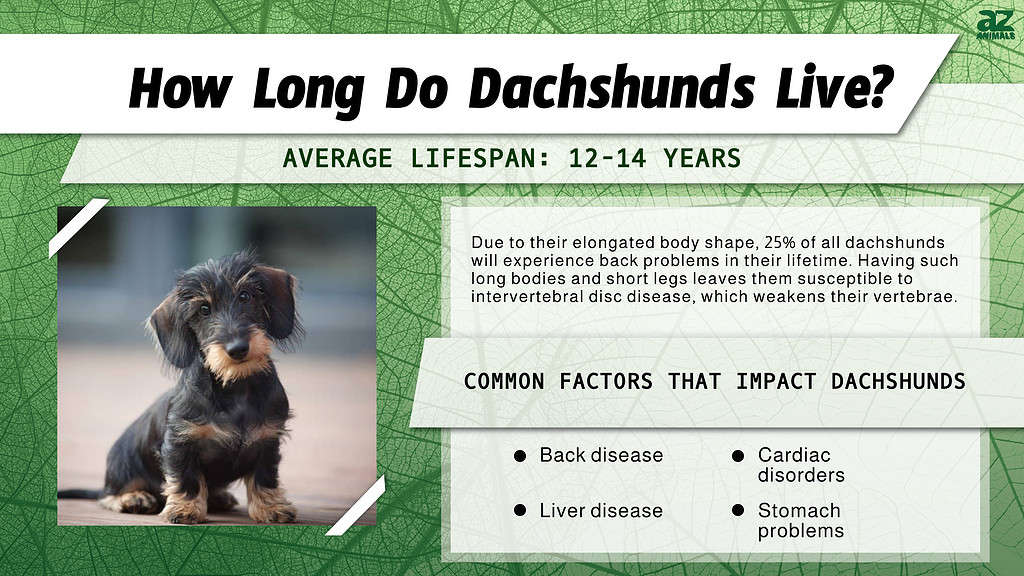
Adorable in both looks and personality, Dachshunds, also known as doxies, have been growing in popularity among dog owners. Bred to hunt small animals, as the name translates to “badger dog,” this small dog breed is both playful, intelligent, and a bit stubborn! It’s no wonder that these days, it seems like everybody wants to take this adorable dog home as a pet.
Have you ever wondered what the lifespan of a dachshund is? If you’re interested in keeping one of these lively and intelligent dogs as a household pet, then you’ll definitely want to know how long you can expect for them to live.
How Long Do Dachshunds Live?

Dachshunds have a wide variety of coat colors and patterns, with red being the most popular.
©otsphoto/Shutterstock.com
The average lifespan for a dachshund is 12-14 years. According to a study published in The Veterinary Journal, the longest-lived dog breeds included the Miniature poodle, Bearded Collie, Border collie, and Miniature Dachshund.
In fact, two of the oldest dogs that have ever lived were both dachshunds. Chanel, a wire-haired dachshund, held the world’s oldest dog record until she passed away at the age of 21.
There are many factors that contribute to how long a dachshund will live and these include its overall health, lifestyle, and diet. However, another one of the largest determining factors is the specific breed-related health issues that come up for these pups.
The Dachshund Life Cycle
Curious about what the life cycle of a dachshund looks like? Let’s learn more about how this playful breed grows into adulthood.
Gestation and Birth
Dachshunds typically have a gestation period of 63 to 65 days. A female dachshund can, however, give birth at around 53 or even 71 days. Dachshunds typically have 1 to 6 puppies per litter, however, this number might increase depending on the size of the dog.
Puppies

©iStock.com/CBCK-Christine
Puppies are born blind and deaf and dachshunds are no exception. They can’t see or hear until they’re nearly two weeks old – they don’t even open their eyes before that! Puppies rely on their sense of smell to find their mother until they can see and hear. Dachshund puppies will spend 15 to 20 hours per day sleeping. Just like newborn babies, they require a lot of rest so that their bodies can utilize the energy to develop properly.
Adolescence
A Dachshund’s adolescence begins from the ages of six to nine months and ends at about a year. During this time, the dog will undergo several behavioral and emotional changes. You can even think of this as “dog puberty.”
Some indicators of adolescence include increased energy and a heightened interest in their environment and learning new things. Dachshunds in adolescence will also begin to bark more and may even engage in destructive behaviors such as chewing and biting on objects.
Maturity
According to the Dachshund Club of America, Dachshunds reach sexual maturity around six months and are considered full size between seven and eight months. However, they continue to fill out and grow until 18 months. A full-grown dachshund will weigh anywhere between 16 to 32 pounds, depending on its body height and length.
What Affects the Lifespan of a Dachshund?
Dachshunds are susceptible to a variety of health disorders. These health issues are often one of the largest contributing factors to how long a dachshund will live. Other factors include the amount of daily exercise they get and the type of diet they eat. Unlike many other dog breeds, dachshunds also have an incredibly unique body shape. This also accounts for their lifespan and quality of life.

A Dachshund was the first Olympic mascot.
©Shedara Weinsberg/Shutterstock.com
Common Dachshund Health Problems
The most common health problems that Dachshunds will often suffer from include:
- Back disease
- Dental issues
- Obesity
- Cardiac disorders
- Neurological disorders
- Eye problems
- Liver disease
- Stomach problems
Most commonly, the breed will suffer from back problems due to their elongated body shape. In fact, 25% of all dachshunds will experience back problems in their lifetime. Having such long bodies and short legs leaves them susceptible to intervertebral disc disease, which weakens their vertebrae. Luckily, there are many proactive measures that pet owners can take in order to prolong the life of their dachshund!
How to Extend the Life of Your Pet Dachshund
As a member of your family, your dachshund will need specific care to keep them healthy. Let’s go over the best ways to care for your dachshund to extend their lifespan for years to come:
- In order to avoid spinal issues, it is important to make sure that they exercise regularly. Regular exercise will keep helps strengthen their core and back muscles. This helps prevent back injuries and excessive weight gain that puts pressure on their small frames. A minimum of 30 to 60 minutes of exercise per day is a great way to keep them fit and healthy.
- Dachshunds love to eat! Unfortunately, their hearty appetites and small bodies can lead them to gain weight more easily than other dog breeds. Obesity amongst dachshund dogs is a serious issue. Gaining a lot of excess weight will put a strain on the dog’s back. In order to avoid this, make sure to feed them a healthy diet that consists of meat, chicken, and fish are necessary for their nutritional needs.
- Learning how to properly hold your dachshund is another important way to protect them. With such a long torso and short legs, it’s important to approach picking them up differently from other dog breeds to avoid back problems. Make sure to grab them with one hand under their rear end and one hand under his belly to support his back.
The photo featured at the top of this post is © iStock.com/JLSnader
Thank you for reading! Have some feedback for us? Contact the AZ Animals editorial team.






